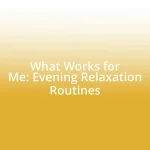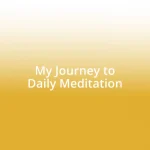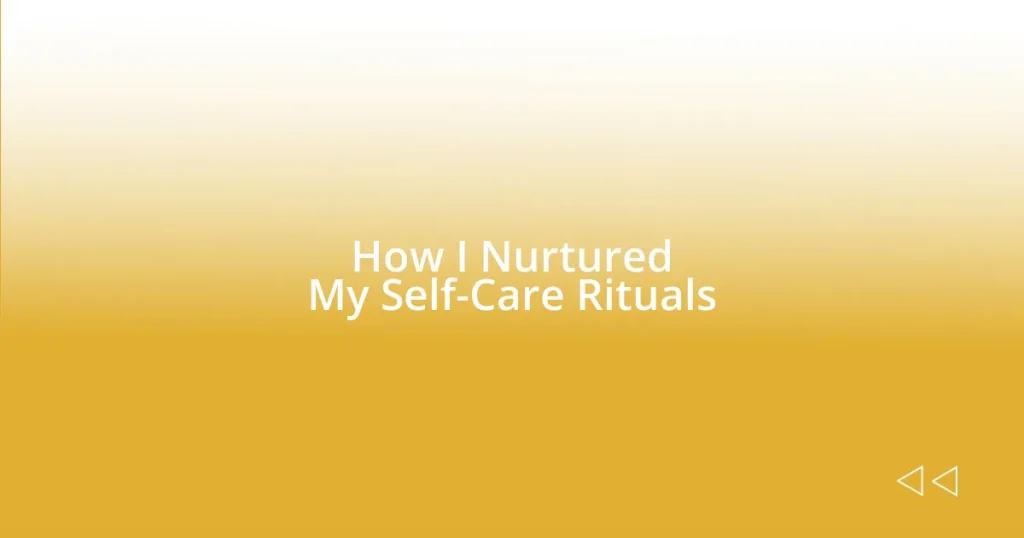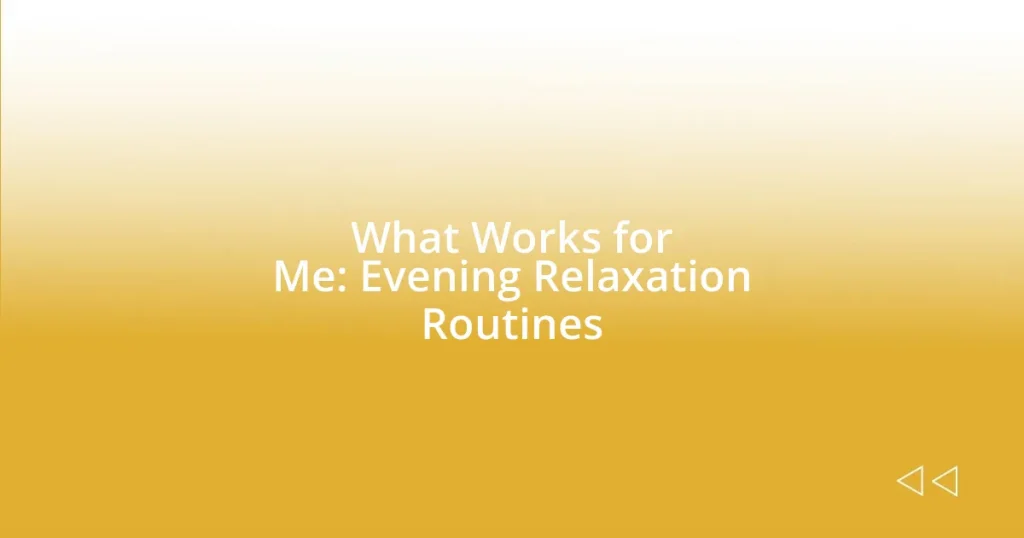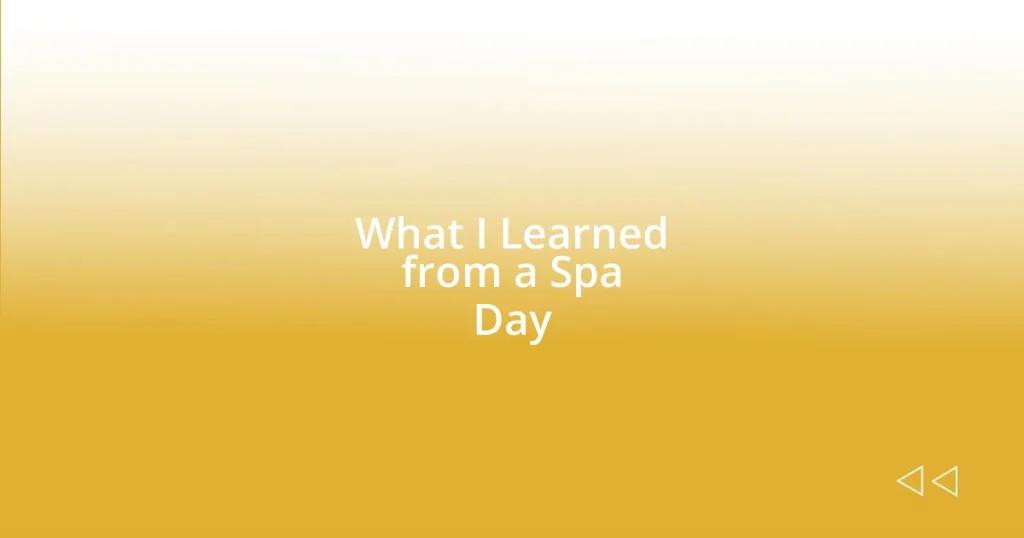Key takeaways:
- Self-care is not a luxury but a necessity, enhancing overall well-being and enabling better service to others.
- Identifying personal self-care needs through reflection and experimentation leads to more effective and joy-inducing practices.
- Integrating mindfulness into daily routines elevates self-care experiences, helping to engage fully with the present moment.
- Regularly assessing and adjusting self-care practices ensures they remain meaningful and aligned with current emotional needs.
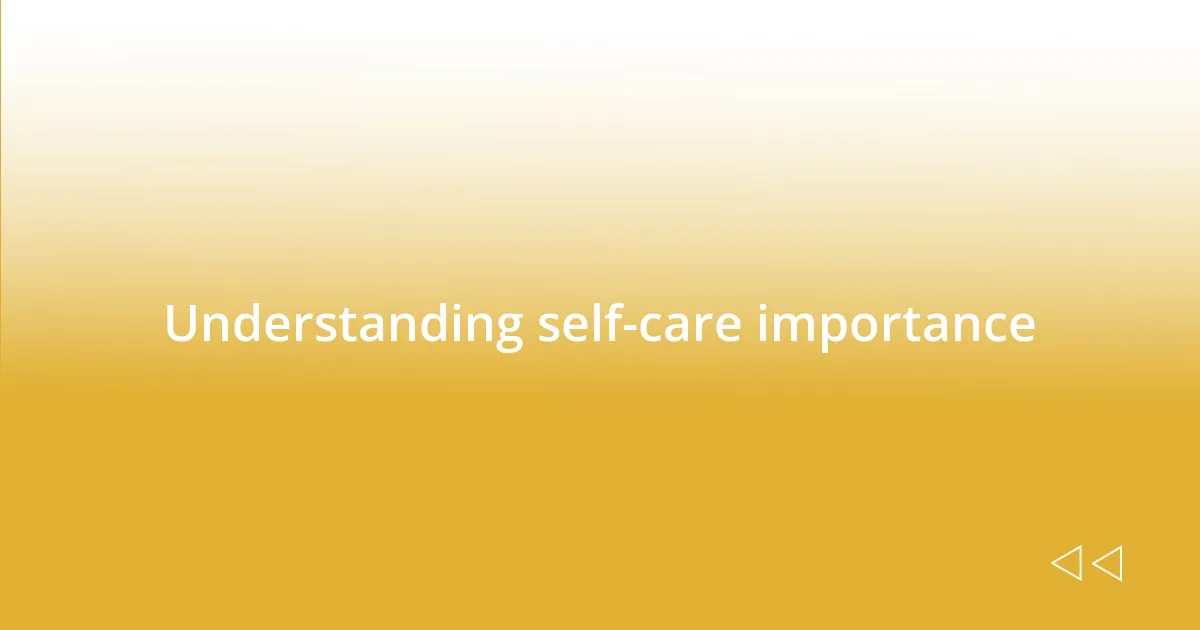
Understanding self-care importance
Self-care is vital for our overall well-being. I remember a time when I was overwhelmed with work and personal responsibilities. I prioritized self-care, and it dramatically changed my mindset—suddenly, I felt more balanced and capable of tackling my to-do list.
Think about it: How can we truly serve others if we are running on empty? I often realized that the more I neglect my self-care, the more irritable and stressed I became. During those moments of exhaustion, I learned that taking just a few minutes each day for myself—whether it’s a quiet cup of tea or a short walk—made a world of difference.
When I finally embraced the importance of self-care, it became clear that it’s not just a luxury; it’s a necessity. I’ve found that physically nurturing myself—like drinking enough water and getting enough sleep—allows me to engage more fully with life. What if we all made a commitment to ourselves to prioritize this? Imagine the ripple effects we could create.
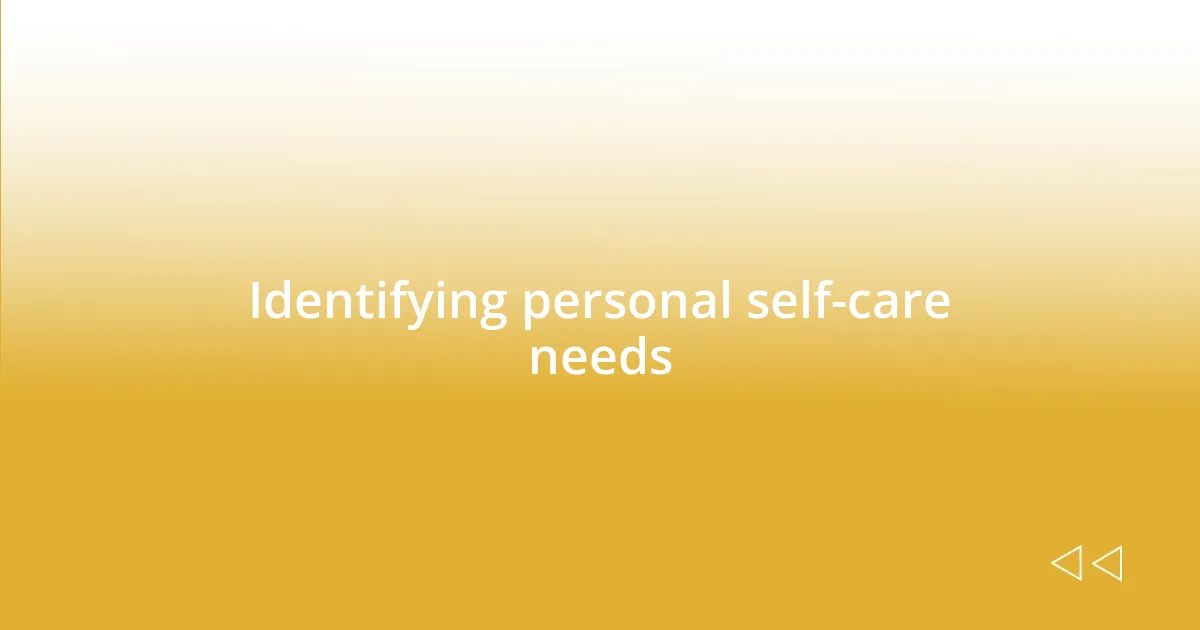
Identifying personal self-care needs
Identifying personal self-care needs can be a transformative journey. For me, it started with reflecting on what truly rejuvenated my spirit. I realized that some activities felt like chores rather than care, like scrolling through my phone for hours, which often left me feeling even more drained. By honestly assessing how I spent my time, I could pinpoint the activities that genuinely brought me joy and relaxation.
To help you identify your own self-care needs, here are some tips I found effective:
- Reflect on your emotions: Take note of how you feel during different activities. Do some energize you, while others deplete you?
- Experiment with different practices: Try a variety of self-care strategies, from meditation to painting or even a leisurely walk in nature.
- Listen to your body: Pay attention to physical signals. Are you tense? Fatigued? Your body often communicates what it needs.
- Consider your lifestyle: We all have different obligations and rhythms. What’s manageable for you might vary greatly, so tailor your self-care to fit your unique circumstances.
- Seek feedback from trusted friends: Sometimes, those closest to us can offer insights into what we might overlook concerning our needs.
By embracing this self-discovery process, I became more in tune with what truly nourished my well-being, ultimately allowing me to set boundaries and prioritize my time more effectively.
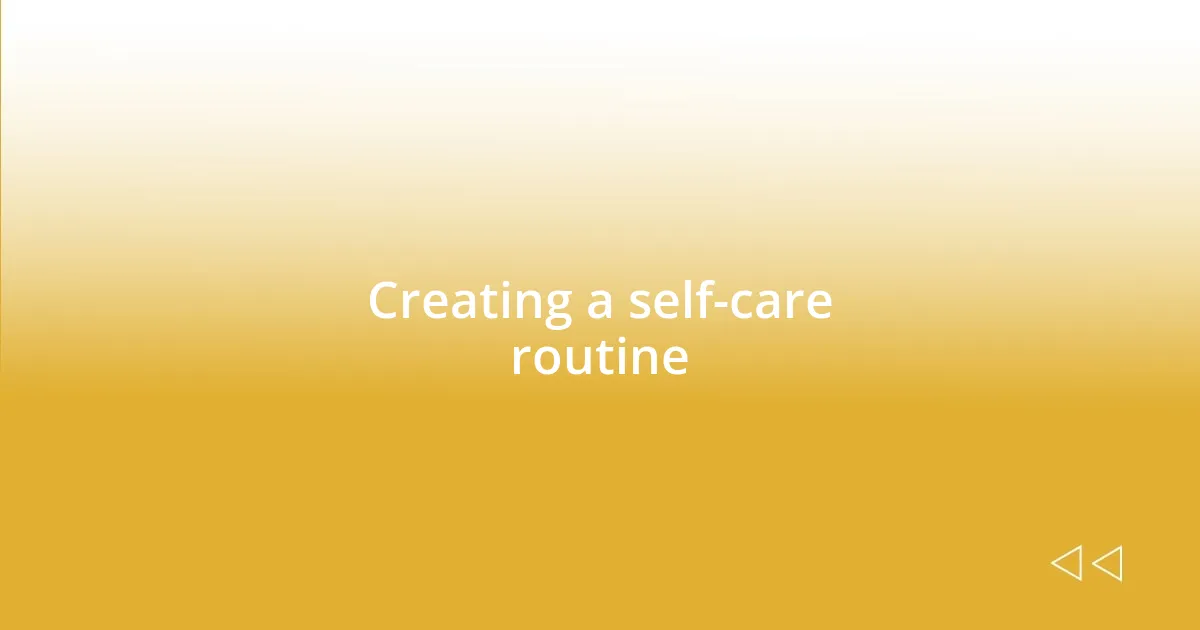
Creating a self-care routine
Creating a self-care routine requires intentionality and thoughtfulness. I found that starting small made all the difference; I chose just one or two practices that resonated with me. For instance, incorporating a daily gratitude journal into my mornings turned out to be a game-changer. Writing down three things I was thankful for helped shift my mindset, letting me start the day on a positive note.
As I explored more about self-care, it became clear to me that variety is essential. I began to schedule self-care activities throughout my week, from yoga sessions to leisurely weekends dedicated to hobbies like painting. This not only made my routine enjoyable but allowed me to cultivate a sense of anticipation for these moments. I often think, if I can carve out this time for myself amidst my busy schedule, doesn’t that reinforce my commitment to my own well-being?
Building a self-care routine isn’t a one-size-fits-all approach; it’s about personalizing what works best for you. In my experience, I noticed that when I tailored my practices to fit my needs and preferences, I was far more likely to stick with them. For instance, I learned that an evening meditation session suited me more than a morning one. It’s all about finding your rhythm and understanding what truly nourishes your soul.
| Self-Care Activity | Benefits |
|---|---|
| Morning Gratitude Journal | Creates a positive mindset for the day |
| Evening Meditation | Helps unwind and promotes relaxation |
| Weekly Yoga | Enhances physical and mental well-being |
| Hobby Time (like painting) | Encourages creativity and stress relief |
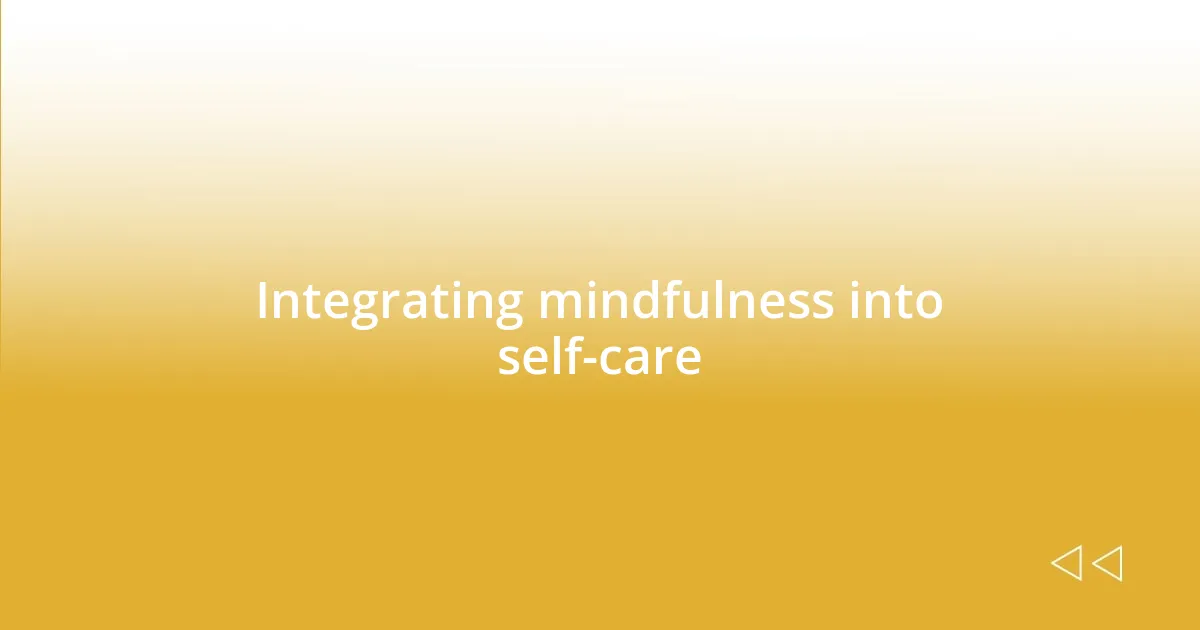
Integrating mindfulness into self-care
Integrating mindfulness into self-care has been pivotal in enhancing my overall well-being. I remember the first time I tried mindful breathing during my lunch break; it felt like a refreshing reset. By simply focusing on my breath, I became aware of the tension I was holding, and it dawned on me how often I operated on autopilot. Have you ever noticed that too? Mindfulness encourages us to engage fully with the present, transforming mundane moments into opportunities for self-care.
One of my favorite mindful practices is savoring my morning coffee. Instead of drinking it hurriedly while checking emails, I take a few moments to truly enjoy the aroma and flavor. This simple shift has turned my routine into a mini-meditation, where I can reflect and ground myself for the day ahead. It’s amazing how such a small change can cultivate a sense of calm. How often do we rush through life without truly experiencing it? This act of mindfulness feels like a warm hug for my soul.
At times, I’ve found myself distracted, caught up in my thoughts during self-care activities. To combat this, I incorporate guided meditations that gently bring my focus back. I recall a session where I had to visualize stress melting away like ice on a warm day. It took practice, but now, I look forward to these moments of clarity. They remind me that self-care isn’t just about physical activities; it’s equally about nurturing our minds. Have you tried integrating mindfulness into your own rituals? It might just transform how you perceive care.
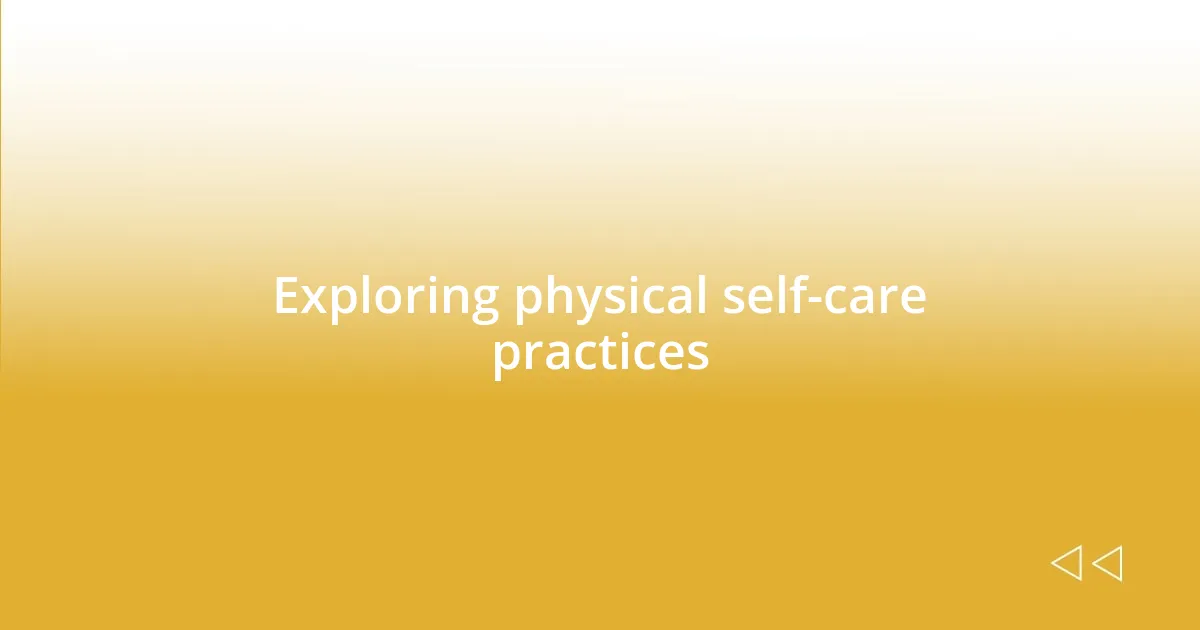
Exploring physical self-care practices
Exploring physical self-care practices has been a transformative journey for me. One of my best discoveries was the sheer joy of movement through dance. I remember stepping into my living room, blasting my favorite tunes, and just letting loose without any judgment. Have you ever felt that pure freedom that comes from dancing like nobody’s watching? It not only got my heart pumping but also lifted my spirits. I found that this simple practice allowed me to connect with my body in a joyful way, reminding me that exercise doesn’t have to feel like a chore.
Another essential aspect for me has been nature walks. There’s something incredibly grounding about being outdoors. I recall a day when I decided to take a walk in the nearby park after a long week. As I breathed in the fresh air and listened to the rustling leaves, I felt all my worries fade away. Have you ever noticed how a change of scenery can clear your mind? I realized that these physical activities were not just about fitness; they were my escape and my way of reconnecting with myself.
I also realized that nurturing my body with proper nourishment connects deeply to self-care. I began experimenting with cooking healthy meals, turning it into a creative outlet. I remember the first time I prepared a vibrant salad with ingredients I had never tried before. With each colorful layer, I felt a sense of pride and satisfaction. What I learned is that by caring for my body with wholesome food, I was also caring for my spirit. Have you explored the ways food can enhance your well-being? It’s an incredibly rewarding practice that feeds both body and soul.
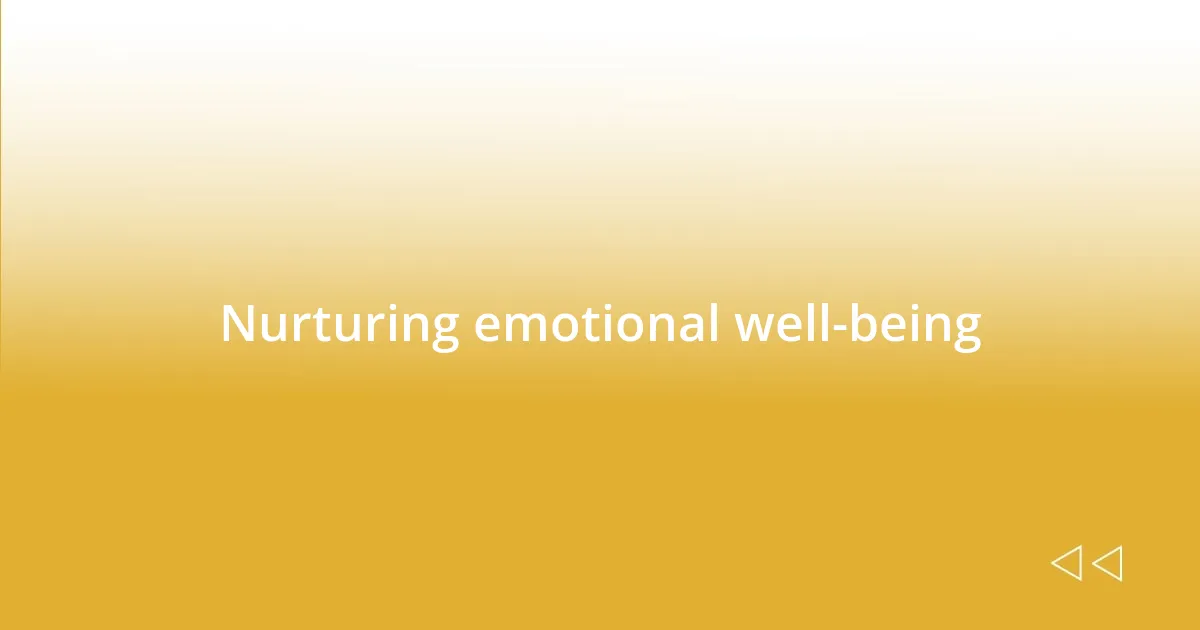
Nurturing emotional well-being
Nurturing emotional well-being has significantly shaped my self-care rituals. I remember a particularly challenging week when I felt overwhelmed by work and personal commitments. I decided to dedicate Sunday evenings to journaling my thoughts and feelings; it became a safe space for me to process everything swirling in my mind. Have you ever tried writing down your worries? It’s fascinating how putting pen to paper can release pent-up emotions and clarify what truly matters.
Another powerful tool I’ve embraced is gratitude. Each morning, I take a moment to reflect on three things I’m thankful for. One day, it was as simple as the warmth of my blanket and the sounds of birds outside. This practice elevates my mood and shifts my focus from what’s lacking to what’s abundant in my life. It’s incredible how this shift in perspective can transform an entire day. Do you often acknowledge the small joys in your life?
Additionally, I’ve made it a habit to check in with my emotions throughout the day. I set reminders on my phone that prompt me to pause and ask myself how I’m feeling. On one occasion, I realized I had been brushing aside feelings of stress but acknowledging it allowed me to take a break instead of pushing through. It’s a gentle reminder that our emotions deserve attention. Have you created spaces in your day to reconnect with your feelings? Acknowledgment can pave the way for deeper emotional healing and resilience.
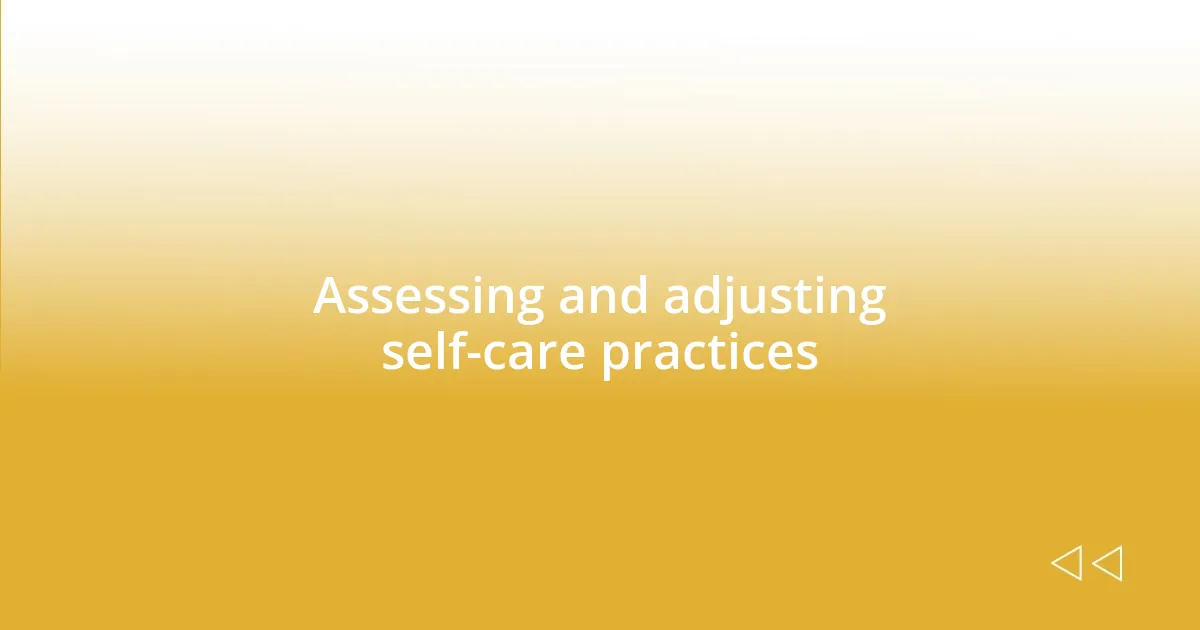
Assessing and adjusting self-care practices
Assessing my self-care practices has been an ongoing revelation. After a period of focusing on journaling, I took a step back and asked myself, “Is this still serving me?” One weekend, I reflected on my journaling habits, realizing they had become a routine rather than a healing tool. This insight prompted me to revise my approach, incorporating prompts that sparked deeper reflection. Have you ever felt like your self-care practices have lost their essence?
I’ve come to appreciate that adjusting self-care isn’t just beneficial; it’s essential. I recall a time when my gratitude practice felt stale, almost robotic. In response, I decided to switch things up by integrating gratitude walks, where I consciously acknowledge my surroundings and express thanks for what I see. The fresh perspective gave my daily practice new life. Isn’t it fascinating how a change in scenery can reignite the spark in something that once felt mundane?
Regularly checking in with my emotional state has made me more attuned to what I truly need. I remember a day when my chosen self-care activity—a movie marathon—felt unfulfilling. I paused to ask myself why. It turned out I needed connection, not escapism. This prompted me to call a friend to chat instead, illustrating that my needs can shift. How do you assess whether your self-care choices still resonate with you? I’ve learned that being flexible and open to change can lead to more fulfilling experiences.
